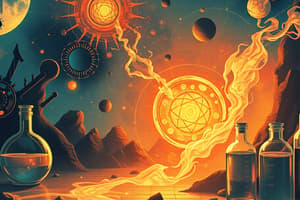Podcast
Questions and Answers
What unexpected outcome did Becquerel observe when he developed the photos from the drawer?
What unexpected outcome did Becquerel observe when he developed the photos from the drawer?
- His chemical compounds reacted to sunlight.
- He discovered a new chemical reaction.
- He found an image of the crystals. (correct)
- He noticed the crystals had emitted light.
Which of the following statements best reflects the underlying theme regarding luck in scientific discovery?
Which of the following statements best reflects the underlying theme regarding luck in scientific discovery?
- Expertise combined with luck can lead to significant discoveries. (correct)
- Luck plays no role in successful scientific discoveries.
- Successful discoveries occur by chance without preparation.
- Scientific breakthroughs are solely the result of random occurrence.
Which individuals are mentioned as having made significant contributions along with Becquerel?
Which individuals are mentioned as having made significant contributions along with Becquerel?
- Hawking and Feynman.
- Einstein and Curie.
- Galileo and Newton.
- Fleming and Rontgen. (correct)
What type of substances are mentioned as having widespread medical applications?
What type of substances are mentioned as having widespread medical applications?
What common trait do the scientists mentioned in the content share regarding their successes?
What common trait do the scientists mentioned in the content share regarding their successes?
What role does luck play in scientific discoveries, as discussed in the content?
What role does luck play in scientific discoveries, as discussed in the content?
What unexpected observation did Sir Alexander Fleming make that led to the discovery of penicillin?
What unexpected observation did Sir Alexander Fleming make that led to the discovery of penicillin?
How did Wilhelm Rontgen's experiment with a cathode ray tube unexpectedly lead to the discovery of X-rays?
How did Wilhelm Rontgen's experiment with a cathode ray tube unexpectedly lead to the discovery of X-rays?
What hypothesis did Henry Becquerel initially think was correct regarding his investigations with uranium?
What hypothesis did Henry Becquerel initially think was correct regarding his investigations with uranium?
What is a common misconception about the scientific method as implied in the content?
What is a common misconception about the scientific method as implied in the content?
Flashcards are hidden until you start studying
Study Notes
The Scientific Method and Luck
- Common belief: all scientists strictly follow the scientific method during research.
- Typical process: form a hypothesis, design and conduct an experiment, draw conclusions.
- If the hypothesis is incorrect, scientists formulate a new hypothesis and repeat the process.
- Luck is a significant but often overlooked element in scientific discoveries.
Key Discoveries Driven by Luck
-
Penicillin: Discovered by Sir Alexander Fleming in 1928 while studying bacteria.
- Noted unexpected green mold on a dish left near a window.
- Mold produced a chemical that killed bacteria, leading to the development of penicillin.
-
X-Rays:
- Discovered by Wilhelm Röntgen in 1895 using a cathode ray tube.
- Filled the tube with a gas; the radiation caused a barium compound screen to glow.
- By chance, heavy paper placed between the tube and screen led to the realization that X-rays could penetrate objects.
-
Radioactivity:
- Henry Becquerel's discovery followed Röntgen's work, studying X-rays with uranium-containing chemicals.
- Initially believed sunlight induced X-ray production; discovering images on photographic plates in a drawer revealed the chemicals were responsible.
- Becquerel’s hypothesis was proven wrong, leading to the understanding of radioactivity.
Impact of Discoveries
- Penicillin, X-rays, and radioactive chemicals are crucial in modern medicine.
- These discoveries have transformed healthcare and the understanding of diseases.
Preparedness and Expertise
- Success in science often combines luck with preparedness.
- Years of laboratory work equipped Fleming, Röntgen, and Becquerel with the expertise to recognize and exploit their observations.
- The notion extends beyond science: success in life can similarly benefit from preparedness meeting opportunity (luck).
Conclusion
- Scientific discoveries are not merely the result of methodical experimentation; they often involve elements of chance and require the readiness to capitalize on unexpected events.
Studying That Suits You
Use AI to generate personalized quizzes and flashcards to suit your learning preferences.




